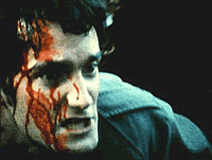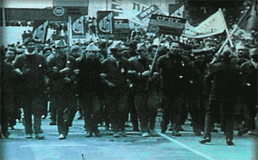|
Newest Reviews:
New Movies -
The Tunnel
V/H/S
The Tall Man
Mama Africa
Detention
Brake
Ted
Tomboy
Brownian Movement
Last Ride
[Rec]≥: Genesis
Hara-Kiri: Death of a Samurai
Indie Game: The Movie
Abraham Lincoln: Vampire Hunter
Old Movies -
Touki Bouki: The Journey of the Hyena
Drums Along the Mohawk
The Chase
The Heiress
Show
People
The Strange Affair of Uncle Harry
Pitfall
Driftwood
Miracle Mile
The Great Flamarion
Dark Habits
Archives -
Recap: 2000,
2001, 2002,
2003, 2004
, 2005, 2006,
2007 , 2008
, 2009 ,
2010 , 2011 ,
2012
All reviews alphabetically
All reviews by star rating
All reviews by release year
Masterpieces
Screening Log
Links
FAQ
E-mail me
HOME
| |
A Grin Without A Cat (Chris Marker) 1977
 In its best moments, A
Grin Without a Catł Chris Markerís epic documentary about the worldwide
Leftist movement from the mid-sixties to the mid-seventies, achieves a sort of
filmic epiphany that revels in the true potential of the medium. Through its
impressive collage of recordings, it suggests that media is capable of totally
capturing the sentiment of a moment, even when the filmmaker doesnít
necessarily intend it to, as one shaky cameramanís jittery footage suggests.
Marker, like Eisenstein (whose agitprop Battleship
Potemkin is evoked throughout), also believes in its ability to create a
sense of upheaval where there was none before. There are several instances the
film where we see the direct application of media as propaganda, most notably in
a scene in which the American Army broadcasts the sound of a dying man across
the Vietnamese jungles in order to demoralize the troops, but the impression
emerges that most propaganda is far less obvious. By bouncing his found footage
against scenes from Potemkin, Marker
seems to suggest that there is an intrinsic link between political revolution
and the revolution that makes still images move when projected onscreen at 24
frames per second, and that link seems to be movement itself. The fictional
images that Eisenstein filmed in the twenties and the documentary images of
riots from the sixties that Marker includes look startlingly similar. A feeling
of global inertia emerges in the film, as Marker connects the world-spanning
events that he opts to show, illustrating how the advance or defeat of one group
of socialists usually prodded another to act, creating an extraordinary chain of
events.
In its best moments, A
Grin Without a Catł Chris Markerís epic documentary about the worldwide
Leftist movement from the mid-sixties to the mid-seventies, achieves a sort of
filmic epiphany that revels in the true potential of the medium. Through its
impressive collage of recordings, it suggests that media is capable of totally
capturing the sentiment of a moment, even when the filmmaker doesnít
necessarily intend it to, as one shaky cameramanís jittery footage suggests.
Marker, like Eisenstein (whose agitprop Battleship
Potemkin is evoked throughout), also believes in its ability to create a
sense of upheaval where there was none before. There are several instances the
film where we see the direct application of media as propaganda, most notably in
a scene in which the American Army broadcasts the sound of a dying man across
the Vietnamese jungles in order to demoralize the troops, but the impression
emerges that most propaganda is far less obvious. By bouncing his found footage
against scenes from Potemkin, Marker
seems to suggest that there is an intrinsic link between political revolution
and the revolution that makes still images move when projected onscreen at 24
frames per second, and that link seems to be movement itself. The fictional
images that Eisenstein filmed in the twenties and the documentary images of
riots from the sixties that Marker includes look startlingly similar. A feeling
of global inertia emerges in the film, as Marker connects the world-spanning
events that he opts to show, illustrating how the advance or defeat of one group
of socialists usually prodded another to act, creating an extraordinary chain of
events.
 Seizing onto
the interplay between nations (which couldnít possibly exist in a world
without mass communication), Marker manages to create a worldwide narrative, of
sorts, in which the struggles of the Left are chronicled. What becomes apparent,
even to a political neophyte like myself, while watching the film, is that most
of the early struggles of the Left were inherent in its inability to consolidate
itself enough in order to form a majority. That consolidation eventually occurs,
but it brings with it a series of compromises that place the Left too close to
the Right to be successful in its attempts to garner public opinion. Marker
doesnít drudge up much sympathy for anyone involved, however, and he exposes
the doublespeak inherent in the political speeches of either side with equal
aplomb. Even the masses fall under his scrutiny. Most of the common people that
Marker (who credits himself here as an editor and creator of the soundtrack, but
not as director) shows are far more concerned with petty bourgeois comforts than
political stances. These arenít exactly earth-shattering revelations, but the
director presents them in an order that makes their interrelatedness feel
revelatory. Originally completed in 1977, and slightly reedited in 1992, A Grin Without a Cat seems eerily prescient in most of its
observations. Due to its unusual intelligence and its surprising lyricism, any
cynicism can be forgiven easily. Seizing onto
the interplay between nations (which couldnít possibly exist in a world
without mass communication), Marker manages to create a worldwide narrative, of
sorts, in which the struggles of the Left are chronicled. What becomes apparent,
even to a political neophyte like myself, while watching the film, is that most
of the early struggles of the Left were inherent in its inability to consolidate
itself enough in order to form a majority. That consolidation eventually occurs,
but it brings with it a series of compromises that place the Left too close to
the Right to be successful in its attempts to garner public opinion. Marker
doesnít drudge up much sympathy for anyone involved, however, and he exposes
the doublespeak inherent in the political speeches of either side with equal
aplomb. Even the masses fall under his scrutiny. Most of the common people that
Marker (who credits himself here as an editor and creator of the soundtrack, but
not as director) shows are far more concerned with petty bourgeois comforts than
political stances. These arenít exactly earth-shattering revelations, but the
director presents them in an order that makes their interrelatedness feel
revelatory. Originally completed in 1977, and slightly reedited in 1992, A Grin Without a Cat seems eerily prescient in most of its
observations. Due to its unusual intelligence and its surprising lyricism, any
cynicism can be forgiven easily.
* * * 1/2
5-6-02
Jeremy Heilman
|